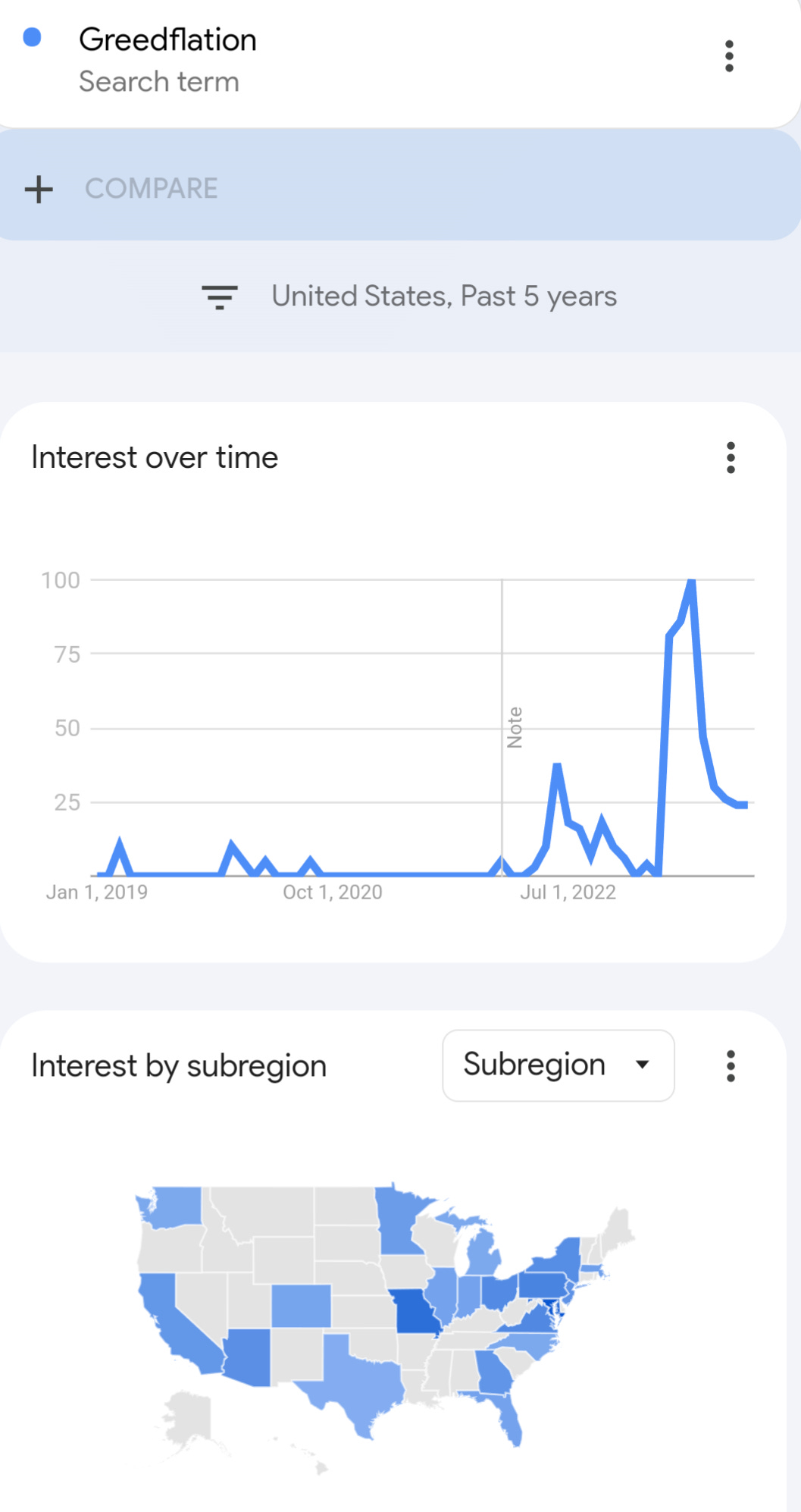Word of the week: Greedflation
Real or fake, bad or good, it's a catchy portmanteau with a moral sting
On November 2, 2023, the office of Senator Bob Casey Jr., Democrat of Pennsylvania, issued a 16-page report with an arresting title: “Greedflation.”

Casey didn’t coin “greedflation,” but he takes full advantage of its power to blame and shame. The report points to an alarming economic trend of the early Covid pandemic: “From July 2020 through July 2022, inflation rose by 14 percent, but corporate profits rose by 75 percent over those two years, five times as fast as inflation.” Casey’s conclusions: “Make corporations pay their fair share” in taxes; “Fight unfair corporate price gouging”; and “Take on corporate monopolies to increase competition and lower costs.”
Those are goals on which large swaths of the American population can likely agree. But how much of the cause is “greed” and how much is some other flavor of -flation?
One theory, favored by politicians and economists on what is loosely called “the right,” is that greed has nothing to do with it: It’s simply a matter of supply and demand. Pandemic stimulus money and pandemic production restrictions created more demand for fewer products, they say, and that caused prices to rise. On the extreme libertarian right are free-market cheerleaders like the Foundation for Economic Education, which was created in 1946 with the stated aim of rolling back the New Deal. (Over the years FEE—talk about an aptronym!—has opposed the Marshall Plan, Social Security, and the minimum wage.) An essay published on FEE.org on November 28, 2023, defends corporate profit-seeking. It’s headlined “Why We Should Be Thankful for Greedflation.” Hear that, Gordon Gekko? Greedflation is good!
In the opposite corner, occupied by what’s usually called “the left,” is a view that was summarized by the New York Times on June 3, 2022: “In a time of extraordinary disruption,” the Biden Administration and progressive organizations contend that “increasingly dominant corporations are taking the opportunity to jack up prices more than they otherwise could, which is squeezing consumers and supercharging inflation. Or ‘greedflation,’ as the hypothesis has come to be known.”
It was the paper’s first usage of greedflation, but it wasn’t an original coinage. Google Trends delivers some tiny blips from as early as pre-pandemic 2019. (I haven’t been able to locate those citations, though.) The first significant spikes appeared in mid-May 2023, when two financial journalists,
and , independently invoked it, to similar ends. “Greedflation is not really a thing, and nobody thinks it is,” Smith wrote on May 15. “Greedflation is fake,” Yglesias opined on May 16.
The dismal science has never been my forte1, but I’m always curious about new economics jargon. Here’s what’s interesting about the word “greedflation”:
The monetary sense of inflation is an American coinage that first appeared in 1838. (Before that, inflation meant “flatulence.”)
Greedflation is one of a handful of novel -flation compounds used in economics and economics-adjacent disciplines.
The earliest was hyperinflation, coined in the 1920s to describe the extreme and ruinous inflation of Germany’s Weimar Republic.
The next -flation portmanteau to attract attention was stagflation (stagnation + inflation) which had been coined in 1965 by Iain MacLeod, who became the UK’s chancellor of the exchequer in 1970. Stagflation was used in 1970s America to describe the combination of high inflation and uneven economic growth.
Then there are shrinkflation (prices rise but quantities decrease) and skimpflation (like shrinkflation, but for services; see Mike Pope’s blog post from November 2021).
Finally we have excuseflation, coined by Bloomberg journalist Tracy Alloway and her podcast co-host Joe Weisenthal in March 2023. In an interview with Vox, which I’m citing because I can’t break through the Bloomberg paywall, Alloway called excuseflation “this idea that companies, you know, maybe they’re taking advantage of the current environment in order to raise prices and really gouging their customers.” So … greedflation by another name?
Perhaps at this point you are wondering, as I was, about that word greed and where it comes from. Imagine my surprise to learn that it’s been around only since the early 1600s and that it’s a backformation from the much older greedy, which has been in the lexicon since Old English. Greedy originally meant “hungry” or “voracious” in the food-and-drink sense as well as “eager for gain or wealth” in the pecuniary sense. Somehow English-speakers got along for centuries without a noun corresponding to the adjective, even though the covetous longing for more stuff has probably been a human trait since time immemorial.
In my more cynical moods I suspect it’s all bullshit, and I am not alone in that suspicion.




Old English did have a noun "giferness" (variously spelled) corresponding to greedy ("grædiġ" in OE), which as you say seemed to be used frequently to mean gluttony. Here's an example from the Bosworth-Toller dictionary:
Gífernys biþ ðæt se man ǽr tíman hine gereordige oððe æt his mǽle to micel þicge mid oferflówendnysse ǽtes oððe wǽtes
(greediness is a man's eating before the time, or taking too much at his meal with superfluity of meat or drink)
https://bosworthtoller.com/17022
And here's a sentence from Alfred's translation of Boethius that sort of links the adjective and noun:
... Tantulus sē cyning, þe on þisse weorolde unġemetlīċe grǣdiġ wæs, and him þǣr þæt ilce yfel fylġde þǣre ġīfernesse
(... King Tantalus, who in this world was excessively greedy, and there [to hell] the same sin of greediness followed him)
(Sorry, I'm just having such a great time with all this OE stuff, as you can tell)